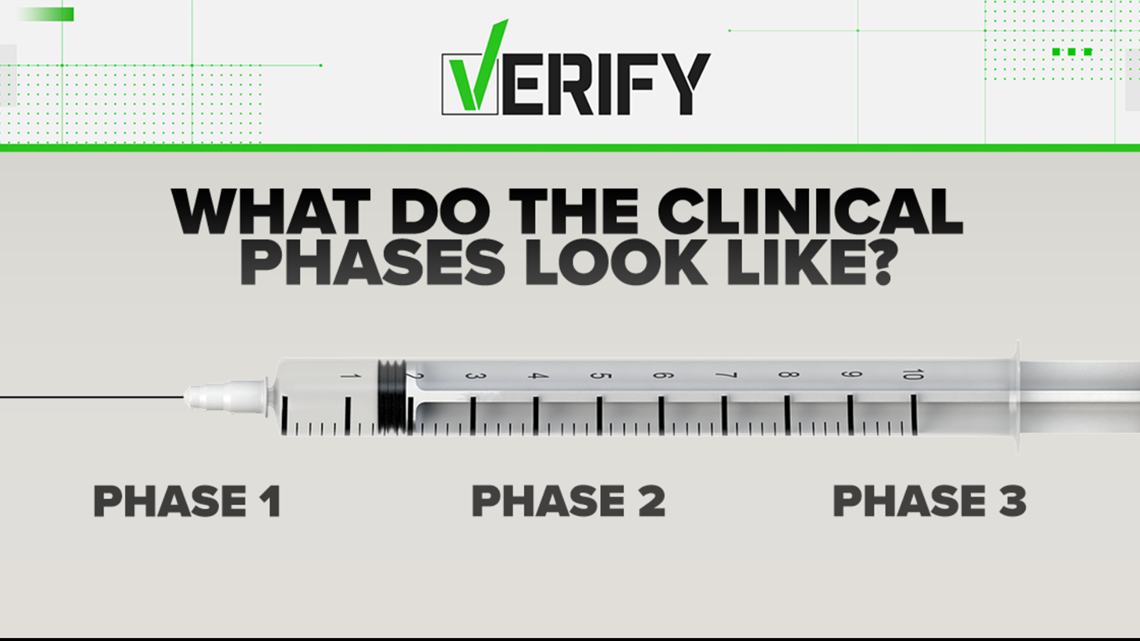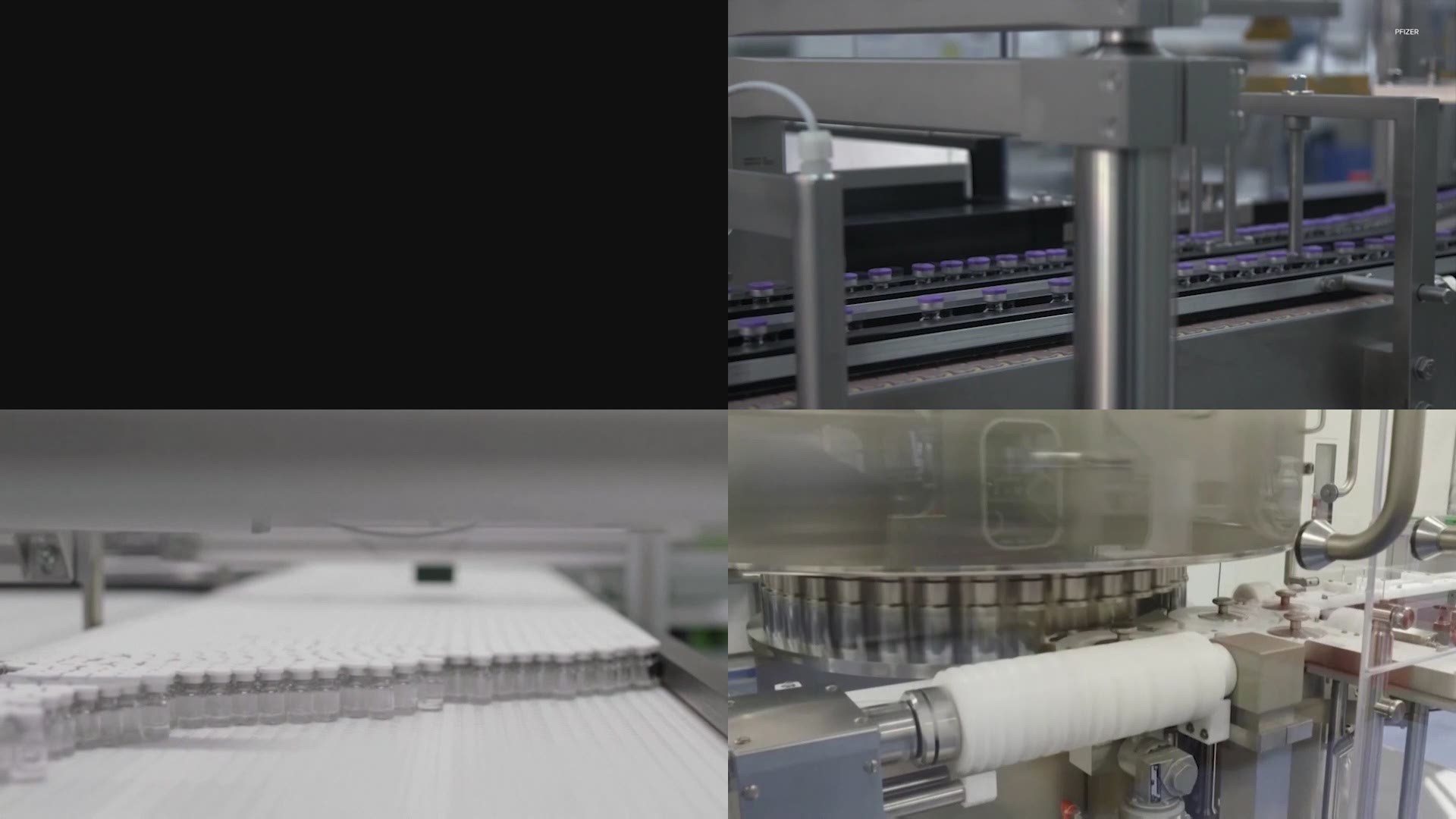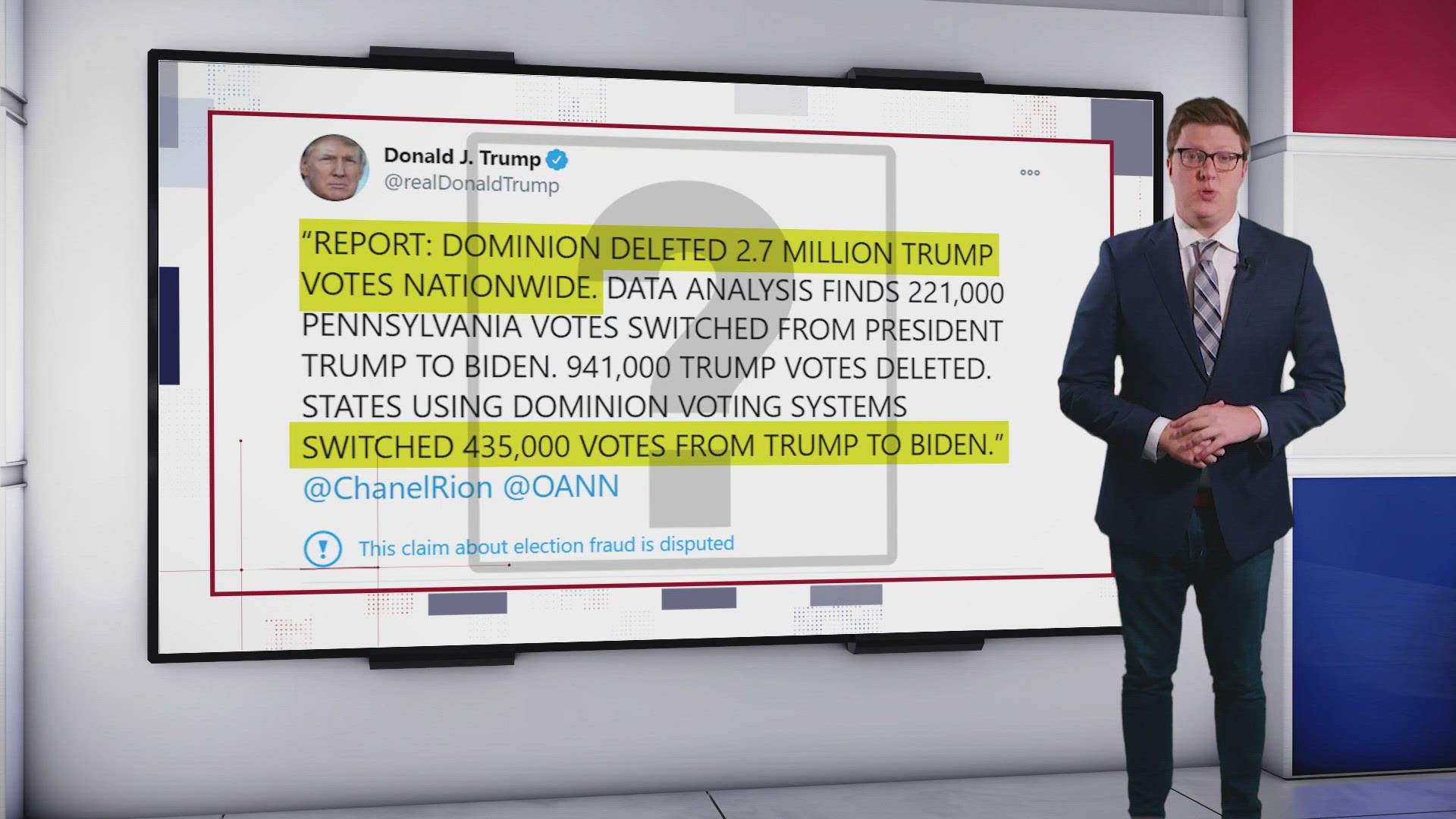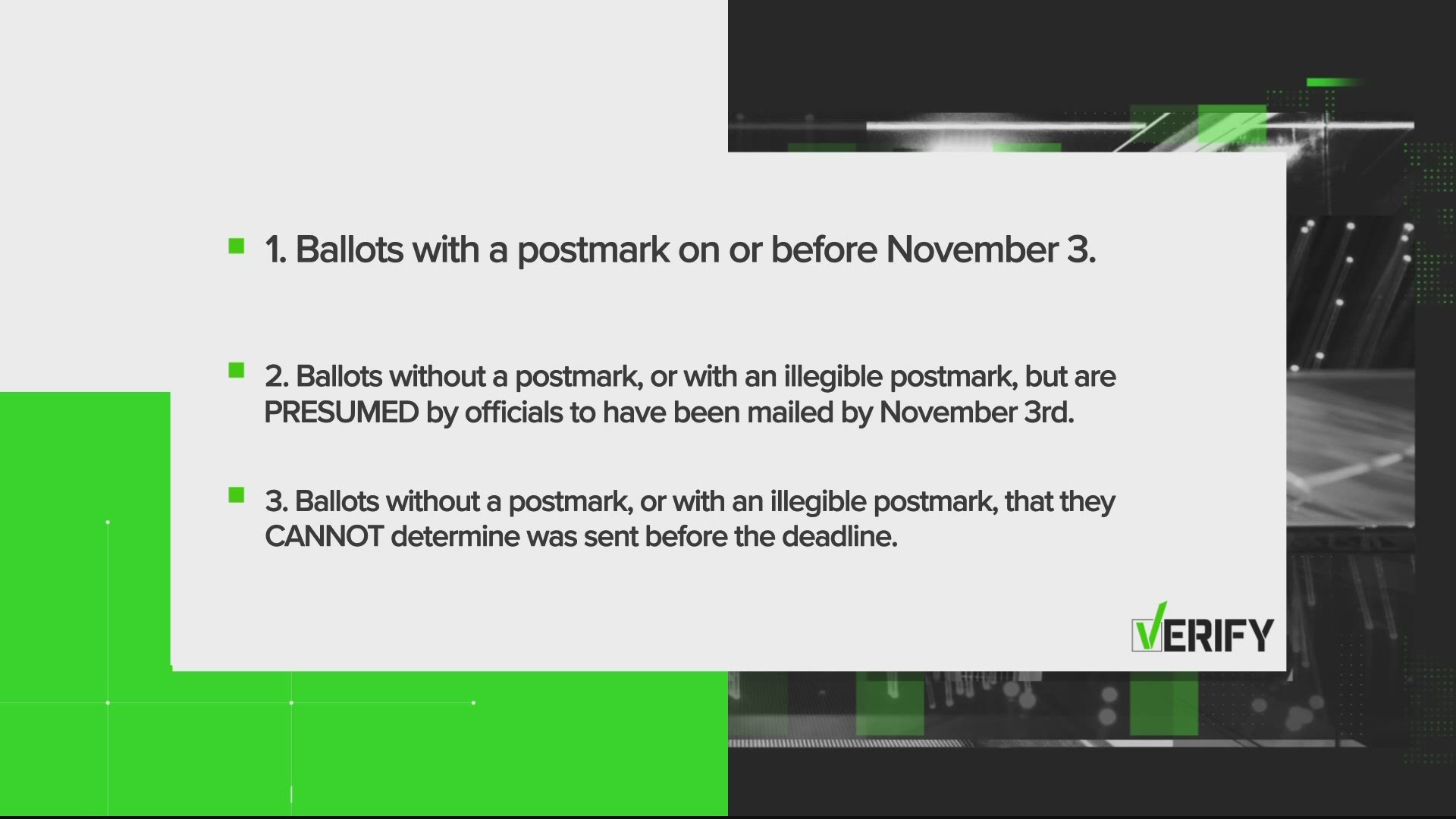WASHINGTON — “Thanksgiving is an emotional holiday," the late Johnny Carson once said. "People travel thousands of miles to be with people they only see once a year... and then discover that once a year is way too often.”
Since the CDC and health experts have asked Americans not to travel this Thanksgiving, many of us will have a different kind of holiday. But some things never change — like the conversation at the dinner table.
Considering 2020 is quite the unconventional year, with an election and a pandemic, there's no shortage of misinformation being spread around.
To help you survive your Thanksgiving dinner, whether it's with your socially distant family, over Zoom or a heated group chat, the Verify team sorted through some of the biggest claims this year has seen, as well as all the explainers and fact-checks you'll need.
Let's get this meal started!
Your appetizer: A vaccine timeline and the latest on COVID-19
We're starting this misinformation feast with the topic of the year: all things coronavirus. From vaccine timelines to microchips and if masks are effective, there's been a lot to work with.
What types of COVID-19 vaccines are in production right now and when will we see them released?
Moderna and Pfizer, two companies producing COVID vaccines, released preliminary finds from their phase 3 vaccine trials this month. And, remarkably, both show efficacy around 95%.
Several infectious disease specialists tell Verify the FDA could approve an Emergency Use Authorization for several vaccines in the next few weeks. But first, the FDA will analyze the companies’ data from their trials to ensure the vaccine is effective and safe.
Who is in charge of making sure vaccines are safe?
Okay, so there are new vaccines coming. But what goes into making sure they are safe, and who decides they are good to go?
The Food and Drug Administration is tasked with regulating vaccines in the United States.
Under U.S. Code, the FDA can use unapproved medical products or unapproved uses of approved medical products in an emergency to help diagnose, treat or prevent serious or life-threatening conditions. They can do this through something called "Emergency Use Authorizations."


There are multiple steps, including running clinical trials in different phases and tracking data by the Data and Safety Monitoring Board, an independent group of 10-15 experts that oversee all vaccine trials and have the power to pause or stop them over safety concerns.
In the coming weeks, companies will be requesting Emergency Use Authorization from the FDA and their Vaccines and Related Biological Products Advisory Committee, known as VRBPAC. The Verify team talked to a site supervisor for Moderna's vaccine, as well as members from the CDC and a vaccine advisory board.
What's the difference between antibodies and antigens and what do some of those medical words really mean?
ANTIGENS: Foreign substances that can cause disease in the body, like a virus. The presence of antigens typically triggers the production of antibodies.
ANTIBODY: A protein produced in response to an antigen. Antibodies help destroy the disease. Antibodies are found in the blood.
I heard that COVID cases are only going up because there's been more testing. Is that true?
No, that's not entirely true. Cases are increasing faster than testing, and the percent of tests that come back positive has been on a steep incline.
Verify researchers used data from The COVID Tracking Project to try to find an answer in the numbers. We first found the day-to-day percent change in new COVID-19 cases and new tests administered. We then found the 14-day average percentage changes of both and charted them against one another.
We found that while cases and tests are both increasing, cases have been increasing at a faster pace since early October.
And here are some other little goodies we'll leave you with:
For the main course: Politics, with a side serving of election security and all things mail-in ballots
Look, we know it's considered rude to talk politics at the dinner table. But with a year like 2020, how can you not? Between a new Supreme Court justice, a crazy election cycle and pending inauguration here's a serving of fact and fiction.
Could Trump run again in 2024?
Yes, he could. The 22nd Amendment limits presidents to two terms, but it doesn’t say that those terms have to be back to back. So, because President Trump has only served one term at this point, he’s legally eligible to serve again in the future.
There's no evidence voting machines deleted millions of Trump votes.
President Trump shared a claim that millions of votes for him were deleted by voting machines. The report the claim was based on never existed.
According to the U.S. Cybersecurity and Infrastructure Security Agency, (CISA) an agency under the oversight of the Department of Homeland Security, “There is no evidence that any voting system deleted or lost votes, changed votes, or was in any way compromised.”
How are election results projected?
Before we dive in, let's make one thing clear: we won't know the finalized winners of the 2020 elections, from your mayor all the way up to your president, until all the votes are counted and the Electoral College finishes voting on December 14. What you hear up until that point are projected winners.
There are three major groups who project election results: The Associated Press, Decision Desk HQ, and Edison Research.
While each of them have their own teams and their own methodologies, they tabulate their predictions in similar ways. They all use some combination of historical election results, demographics, exit polls, nationwide surveys, voter registrations, voter files and votes as they are reported by localities.
What happens if a president doesn't want to concede?
According to the Constitution, the election isn’t official until after the Electoral College votes in December and Congress certifies it.
“The Senate counts the Electoral College votes, the Senate declares the winner,” Dr. Graber said. “Once the Senate declares a winner, it doesn't matter what the president says.”
Even after the election is official, the current president continues with full executive powers until Inauguration Day.
“At 11:59 a.m., January 20, Donald Trump [or any President] has all the powers of the President,” Dr. Graber said. “At 12 o'clock, he's got none of them.”
In 1963, Congress approved what is called the Presidential Transition Act. According to the law, it helps frees up funds to the incoming administration, gives them access to federal officials to transition federal agencies, and brings intelligence briefings.
How do we know mail-in ballots are safe, and why do different states seem to have different processes for them?
The pandemic caused mail-in voting to break records across the country. If you didn’t know it, election rules aren’t uniform. Each state has different deadlines for when they will allow mail-in votes to be counted.
But elections experts, including the National Conference of State Legislatures, tell Verify they are not aware of any state or county that allows anyone other than election staff to touch a ballot once it is placed in a ballot drop box.
Not full yet? Here's some more of our top fact-checks from this election cycle:
- No, ballots in the trash in viral video were not fraud
- Votes don't have to be counted by Election Day. Here's why
- Why did some election results seem to shift drastically overnight?
- Who is paying for Trump's lawsuits for voter fraud?
- Can a new president reverse executive orders from past administrations on their first day in the office?
- Can people vote twice if they go in-person and vote by mail?
- And a deep dive fact-check on the presidential debates.
Lastly,for dessert: Some good old misinformation
Are 'secret sister' gift exchanges legit?
No. Authorities say gift exchanges like these are not legit and are considered illegal pyramid schemes.
What about offers to wrap your car in ads to make money?
If it seems too good to be true, it probably is.
The Verify inbox has been flooded with viewer questions about car wrap offers promising easy money if you let someone shrink wrap your car with an ad.
On its website, the Federal Trade Commission (FTC) explains how typical car wrap scams work: You're told to deposit a check and keep some for yourself, then send the rest to a specialist who will do the work on your car. The specialist never shows, the fake check bounces and they make off with your money.
Can I really get paid to $1,200 to try a COVID-19 vaccine?
No.
The Verify team spoke with Kelsey Coleman, the director of communications and public affairs at the Better Business Bureau. She urged people to be aware of a new scam circulating by text, email and on social media.
As interest in a potential COVID-19 vaccine grows, so do the number of people looking to take advantage. Coleman said a text has been circulating, urging people to join a COVID-19 study, which pays up to $1,200.
“Anybody who is asking you for your banking information, that’s a huge red flag," she said. "You should never have to pay for a legitimate study.”
I heard that infrared thermometers can hurt a part of your brain... is that true?
A post going around social media claims to show concerns from an anonymous Australian nurse who warns against pointing an infrared thermometer at foreheads.
Our Verify researchers contacted the Food & Drug Administration, and experts in neuroradiology, endocrinology and fire protection engineering.
"These detectors don't emit any infrared light, so that to me is not an issue," Peter Sunderland, a professor at the University of Maryland's Department of Fire Protection Engineering, said.
He explained that these thermometers are used to measure infrared light to determine an object's temperature. Sunderland said some thermometers may emit a dim red light, but that’s a guide for the person taking your temperature.
RELATED: VERIFY: There's no evidence infrared thermometers harm a part of the brain called the pineal gland
Do you have something you want Verified that didn't make this list? Fill out the form below.






